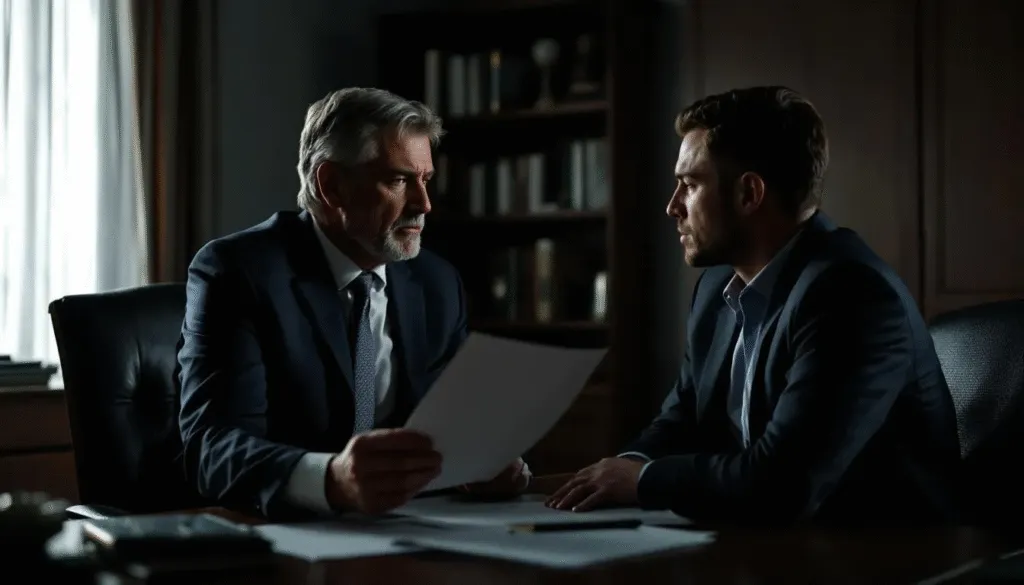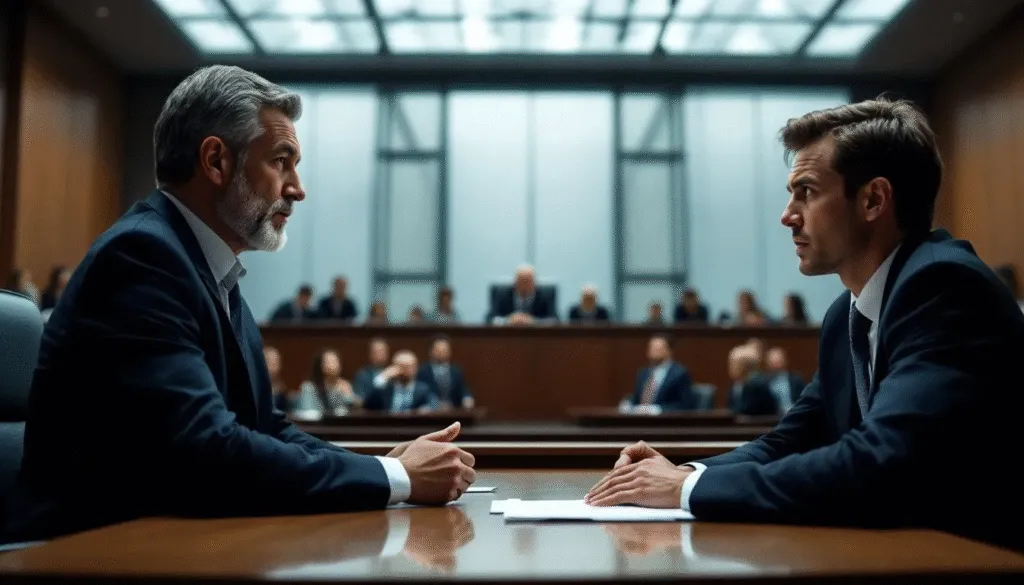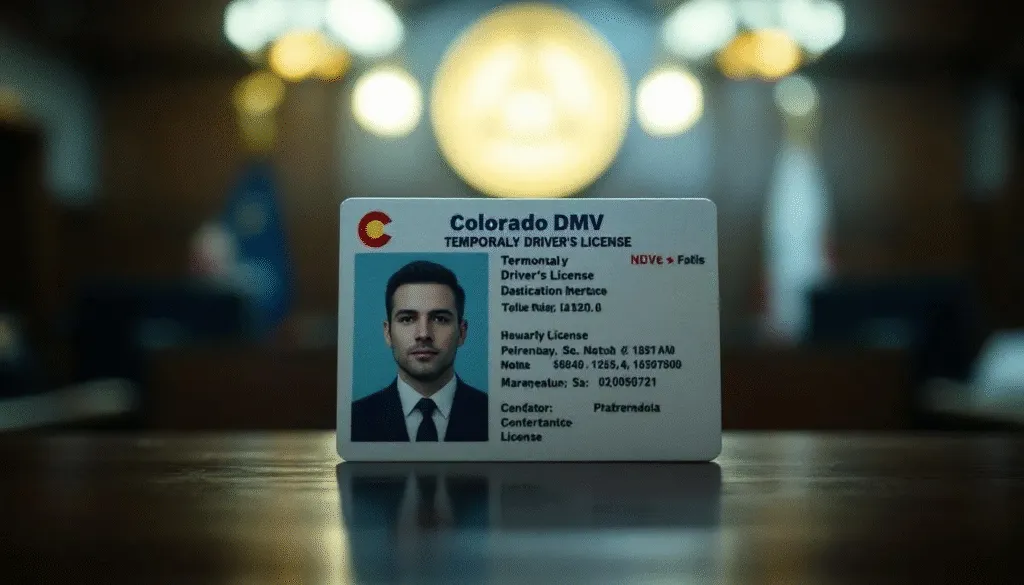Concerned about a DMV hearing in Colorado Springs? Wondering how a lawyer can help? A Colorado Springs DMV hearing lawyer can fight to keep your driving privileges intact after a DUI or DUID (Marijuana /Drugs) arrest. Discover what to expect and how expert legal guidance can make a difference.
show-container
Key Takeaways
- Hiring a DMV hearing lawyer increases the likelihood of retaining your driving privileges by effectively presenting your case and navigating the complexities of the process.
- Requesting a DMV hearing after a DUI arrest must be done within seven days to avoid automatic license suspension, making prompt action essential.
- If the outcome of a DMV hearing is unfavorable, an appeal must be filed within 30 days, and legal representation is crucial for navigating the complexities of the appeal process.show-container
Importance of a DMV Hearing Lawyer

When facing a DMV hearing, your driving privileges are on the line, making legal representation crucial. A Colorado Springs DUI lawyer specializing in DMV hearings can significantly increase your chances of retaining your driver’s license. These legal experts are traffic violations lawyers adept at navigating the complexities of the process, gathering crucial evidence, and presenting a solid defense on your behalf.
DMV hearings are distinct from criminal proceedings and focus exclusively on your driving privileges following incidents like DUI arrests. Criminal charges, on the other hand, are handled in criminal court, where the outcome is determined through a criminal trial. If convicted, you may face criminal penalties such as fines or jail time, which are separate from any administrative actions taken by the DMV. The decisions made in these hearings are influenced by several factors, including the nature of the offense, your driving history, and your compliance with rehabilitation programs. Having a criminal defense attorney by your side ensures that these factors are presented in the most favorable light.
In Colorado, there are three distinct types of license suspensions: administrative, court-ordered, and voluntary. Each carries different implications for those affected. Mitigating circumstances, such as personal hardship or being a first-time offender, can positively influence the outcome of a colorado dmv hearing. An experienced lawyer can effectively highlight these factors to the hearing officer, making a compelling case for retaining your driving privileges, especially since some licenses can be automatically suspended.
show-container
DMV Hearing Process Explained

A DMV hearing is an administrative procedure aimed at reviewing the circumstances of an arrest related to driving privileges. The primary focus is to determine whether your driver’s license should be suspended or revoked. Unlike criminal court proceedings, DMV hearings are civil proceedings, focusing solely on your driving record and the specific incident at hand, as determined by the division of motor vehicles. The DMV hearing is a civil proceeding, not a criminal trial, and addresses only licensing issues rather than criminal penalties.
Preparation for a DMV hearing is crucial. This involves reviewing the details of your arrest, gathering evidence, and developing tailored strategies to present your case effectively. The arresting officer’s testimony is often a key factor, as their statements and evidence can influence the outcome. It is also important to evaluate whether there was probable cause for the initial stop and arrest, as this can impact the legitimacy of the proceedings. If you refuse a chemical test, you have only seven days to request a hearing within this period after receiving notice of the pending suspension to avoid automatic license suspension (C.R.S. §42-2-126). Once you request a hearing, you typically receive confirmation within 24 to 48 hours. It’s a race against time, making it essential to act quickly.
During the hearing:
- Participants present evidence.
- Witnesses can be questioned.
- The hearing officer evaluates the evidence and arguments presented.
- Hearing officers ensure that the process is understood by explaining the hearing’s purpose and procedures to attendees, which is often heard by all participants, and they gather evidence accordingly.
These hearings are often more casual than traditional court settings and can be conducted via Zoom for convenience. The entire process is designed to determine the most appropriate action regarding your determined driving privileges, which may include the option to revoke them.
show-container
Requesting a DMV Hearing After a DUI Arrest
After a DUI arrest, requesting a DMV hearing is a critical step that must be taken within seven days to prevent automatic suspension of your driver’s license. Failing to act within this timeframe results in the immediate revocation of your driving privileges. It’s a high-stakes situation that requires prompt action to protect your ability to drive.
Requesting a hearing involves visiting the Colorado Department of Revenue’s website and completing the necessary forms. The process is straightforward, but acting quickly is crucial. Acting quickly ensures that you have a chance to contest the suspension and present your case before a hearing officer.
Acting swiftly after a DUI arrest is essential to protect your driving privileges. Time is of the essence, and securing a DMV hearing in a timely manner is the first step in safeguarding your rights and maintaining your ability to drive during this challenging period.
show-container
Legal Representation at Your DMV Hearing

A lawyer’s role at a DMV administrative hearing includes gathering evidence, cross-examining officers, especially the arresting officer, whose testimony about the circumstances of the arrest and the administration of the breath test can be pivotal to your defense, and presenting arguments to challenge law enforcement’s evidence. This preparation is vital for navigating the complexities of a DMV hearing.
Having a lawyer at a DMV hearing is highly recommended due to the process’s intricate nature, although it is not mandatory. An attorney can:
- Effectively cross-examine witnesses
- Challenge presented evidence, significantly improving your chances of winning the case
- Provide emotional support, reducing the stress associated with navigating the DMV process.
A Colorado Springs DUI attorney is particularly adept at handling these cases, ensuring that every aspect of your defense is meticulously prepared. With their experience and knowledge, they can provide the best possible defense, helping you retain your driving privileges and navigate the aftermath of a DUI arrest and drunk driving arrest.
show-container
Appealing an Unfavorable DMV Decision

If the outcome of your DMV hearing is unfavorable, you have the right to appeal the decision. Key points about the appeal process include:
- An appeal must be filed within 30 days of the DMV hearing decision.
- During the appeal, the record of the DMV hearing is reviewed.
- No new evidence can be introduced during the appeal.
- The appeal focuses solely on the existing evidence and the procedures followed during the initial hearing.
To delay the suspend during an appeal, a separate request for a stay must be submitted; simply filing an appeal does not automatically delay the suspension. This additional step is crucial to maintaining your driving privileges while the appeal is being processed.
Legal representation during the appeal process is essential. Your attorney representing you can guide you on potential best outcome and strategies, helping navigate the complexities and ensuring your case is presented effectively. Lawyers play a crucial role in this process.
show-container
Common Outcomes of DMV Hearings
The outcomes of DMV hearings can vary widely, depending on the specifics of each case. Common outcomes include license suspension, revocation, or retention of driving privileges. In some cases, your license may be revoked as a result of the hearing, particularly in cases involving DUI in Colorado. Correctly administered blood or breath tests can lead to a 90-day suspension. The standard of proof in a DMV hearing is lower than in a criminal case, making license suspension easier.
Inaccuracies in DMV records can lead to improper license suspension and affect hearing outcomes. Despite being acquitted of DUI charges in criminal court, you can still lose your driving privileges at a DMV hearing. Conversely, it is possible to lose a criminal case yet prevail at the DMV hearing.
Accumulation of too many points on your license can also lead to suspension of your driving privileges due to excessive points. Being aware of these potential outcomes helps you prepare for the hearing and work with your attorney to achieve the best result.
show-container
Understanding Express Consent Affidavits
The express consent law in Colorado mandates that drivers must submit to chemical testing if stopped for suspected DUI. An express consent affidavit is a document that outlines this requirement and the consequences of refusing a test. The required chemical test may include a breath test, which is commonly administered in DUI cases. The main purpose of the express consent hearing is to determine the validity of the police stop and the reliability of the blood test alcohol content (BAC) test.
During an express consent hearing, the evaluation considers whether the police officer properly advised the individual of the law before they declined the test. Gathering and presenting enough evidence to challenge the validity of the traffic stop and the accuracy of the BAC test is crucial in these hearings.
Grasping the nuances of express consent affidavits and the legal requirements for chemical testing is pivotal in defending against a DUI charge and protecting your driving privileges.
show-container
Temporary Licenses During Suspension

A provisional or temporary driver’s license can be a lifeline during a suspension, allowing individuals to drive for essential purposes such as work or education. In some cases, a probationary license may also be available, granting limited driving privileges under strict conditions. To be eligible for a temporary license, you often need to provide proof of need, such as employment verification. These licenses are typically issued under specific conditions, such as not having multiple recent violations.
There are usually restrictions on the times and locations where you can drive with a temporary license. Additionally, a temporary license usually has a limited validity period that corresponds to the duration of the suspension. Receiving a traffic ticket while holding a provisional or probationary license can jeopardize your ability to maintain that license. Completing specific paperwork and paying a fee are part of the application process to obtain a temporary license.
The outcome of DMV hearings can impact your daily life and employment opportunities, making securing a temporary license essential if your driving privileges are suspended.
show-container
Contact Us for Expert Legal Assistance
If you are facing a DMV hearing or a DUI charge, don’t navigate this complex process alone. Reach out for a free consultation to discuss your options and get expert legal assistance for your dui case. Our team is available 24/7 to provide support and answer your questions.
You can contact us via phone or through our online contact form to initiate the consultation. With over 30 years of combined experience, we have the expertise to handle your case effectively and help you achieve the best possible outcome.
Act quickly to protect your driving privileges and ensure that you have the best legal representation on your side. Our experienced attorneys are here to help you every step of the way, safeguarding your driving privilege.
show-container
Summary
Navigating a DMV hearing in Colorado Springs can be a daunting task, but with the right legal representation, you can protect your driving privileges and achieve a favorable outcome. From understanding the importance of a DMV hearing lawyer to the intricacies of the hearing process and the steps to take after a DUI arrest, this guide has covered all the essential aspects.
Don’t let the complexities of the DMV process overwhelm you. Seek expert legal assistance to guide you through every step and ensure that your rights are protected. Your driving privileges are too important to leave to chance.
show-container
Frequently Asked Questions
What if I refused the chemical test?
If you refused to take a chemical test, then immediately contact an expert DUI Lawyer or DUID Attorney as you license and liberty are in serious jeopardy. Taking prompt action is crucial.
Can I represent myself at a DMV hearing?
You can represent yourself at a DMV hearing, but it’s highly advisable to have a lawyer because of the complexities involved in the process.
What happens if I lose my DMV hearing?
If you lose your DMV hearing, your driving privileges could be suspended or revoked, but you have the option to appeal the decision within 30 days.
What is an express consent affidavit?
An express consent affidavit is a legal document that mandates drivers to undergo chemical testing if they are stopped for suspected DUI, detailing the consequences of refusing such a test. Understanding this requirement is crucial for drivers to avoid legal repercussions.
Can I get a temporary license during my suspension?
Yes, you may apply for a provisional or temporary license to drive for essential purposes like work or education during your suspension.
